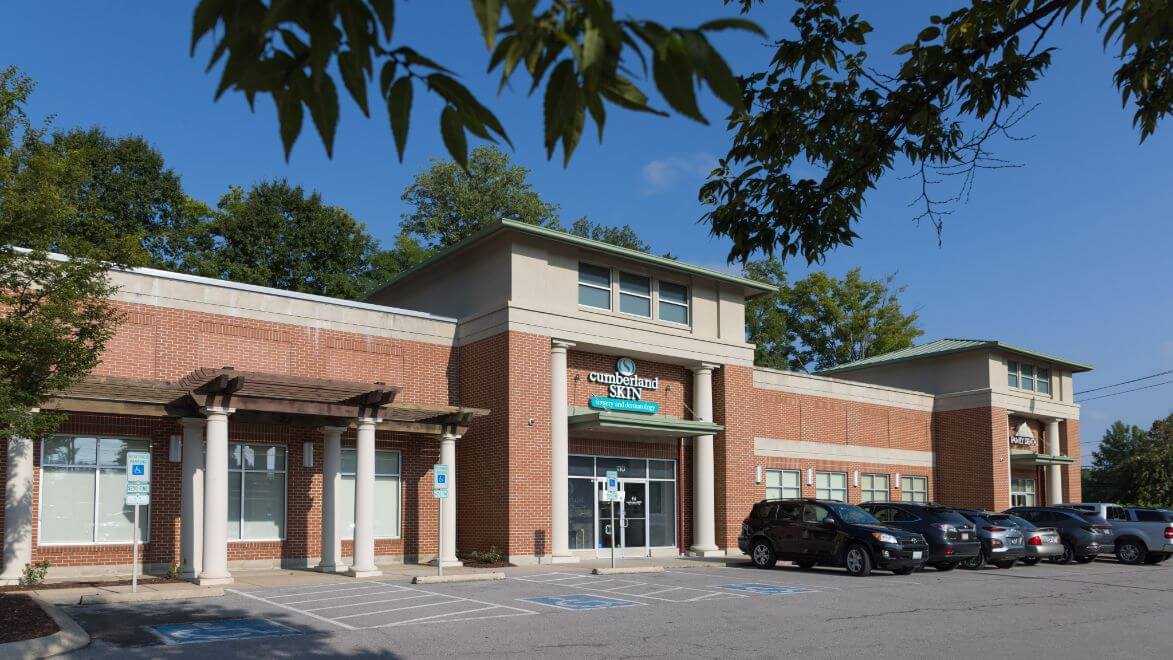Basal Cell Carcinoma
What Is Basal Cell Carcinoma (BCC)? The Most Common Skin Cancer
Basal cell carcinoma (BCC) is the most prevalent form of skin cancer, responsible for the majority of skin cancer cases. It originates in the basal cells, which are located in the deepest layer of the epidermis, the outermost layer of the skin. While BCC is typically slow-growing and less aggressive than other skin cancers, it can still cause significant local tissue damage if not treated promptly.
Basal cell carcinomas can manifest in various forms on the skin, including red patches, pink growths, open sores, and shiny bumps. The primary cause of Basal cell carcinomas is overexposure to ultraviolet (UV) rays, often from the sun or tanning beds. Although BCC is rarely life-threatening when treated appropriately, early detection and treatment are crucial to prevent complications.
Each year, nearly three million people are diagnosed with BCC. This type of skin cancer is most common in individuals whose lifestyles involve excessive UV exposure. Although BCC is increasingly being diagnosed in younger people, it remains most prevalent in those over 40. Individuals with fair skin, blond or red hair, and blue, green, or grey eyes are particularly susceptible, as are men, who face a higher risk of developing the condition.
Examples of Basal Cell Carcinoma
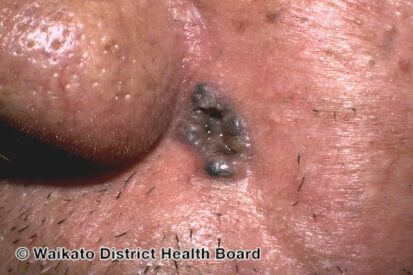
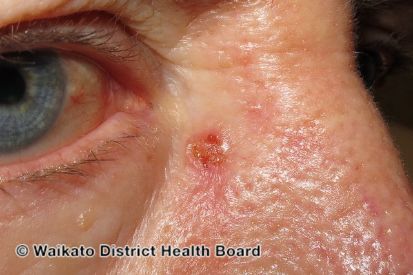
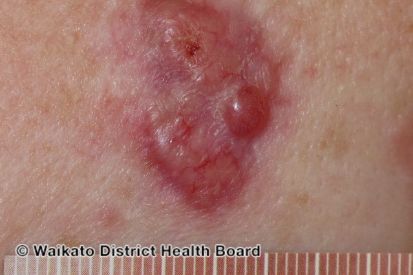
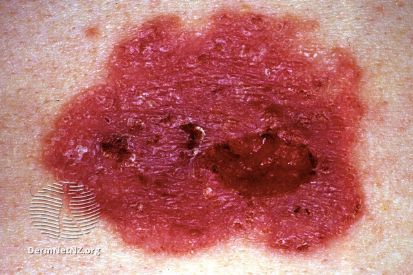
Symptoms of Basal Cell Carcinoma
- Basal cell carcinoma (BCC) often begins as persistent wounds or sores.
- BCC can appear as reddish areas on sun-exposed parts of the body such as the face, neck, arms, and legs.
- BCC might resemble scars, pink growths, or shiny bumps.
- In some cases, they bear a resemblance to moles, contributing to misidentification.
Causes of Basal Cell Carcinoma
- Basal cell carcinoma is caused by spending too much time in the sun.
- Getting sunburnt, especially as a child, increases the risk of BCC.
- Family history of skin cancer.
- A weakened immune system, and exposure to certain environmental toxins can also contribute.
How to Prevent Basal Cell Carcinoma
- Sunscreen is Your Shield: Regularly apply a broad-spectrum sunscreen with at least SPF 30 on all exposed skin, even on cloudy days. Reapply every two hours or more frequently if swimming or sweating.
- Cover Up: Wear protective clothing such as long-sleeved shirts, wide-brimmed hats, and sunglasses to minimize direct sun exposure.
- Avoid Peak Sun Hours: Limit outdoor activities during the sun's strongest hours, usually from 10 a.m. to 4 p.m. If possible, seek shade under trees or use an umbrella.
- Protective Gear for Outdoor Activities: If you're engaging in outdoor sports or activities, consider using sun-protective clothing and gear to create an extra barrier against UV rays.
- Regular Skin Checks: It's essential to schedule annual skin checks with your dermatologist. Early detection is critical to effective treatment plans.
Basal Cell Carcinoma (BCC) FAQs
People with fair skin, a history of frequent sun exposure, or a family history of skin cancer are at a higher risk, though anyone can develop BCC.
Dermatologists diagnose BCC by examining the skin lesion and may perform a biopsy to confirm the presence of cancerous cells.
Yes, Mohs micrographic surgery is an effective treatment for Basal Cell Carcinoma (BCC). This specialized and precise technique is primarily used to remove skin cancers, especially in areas where preserving healthy tissue is vital, such as the face, ears, nose, and other cosmetically sensitive regions.
BCC can recur in the same area. Regular skin checks and follow-ups are crucial for early detection.
Continuing sun protection measures, regular self-examinations, and routine skin checks with a dermatologist are key to preventing recurrence.
A Total Body Skin Examination (TBSE) is a comprehensive evaluation of a person's skin from head to toe conducted by a dermatologist or healthcare professional. During this examination, the healthcare provider systematically inspects the skin, including areas that are not typically exposed to sunlight, to assess for any signs of skin cancer, abnormal moles, or other skin conditions.
The exam usually involves the patient removing all clothing and wearing a gown or drape provided by the healthcare professional. The dermatologist examines the skin, scalp, face, neck, trunk, arms, legs, hands, feet, fingernails, and toenails, checking for any suspicious lesions, moles, discolorations, or changes in existing moles or spots.
Patients are often encouraged to have regular Total Body Skin Exams, especially if they have a history of skin cancer, numerous moles, a family history of skin cancer, or if they spend significant time in the sun. These exams aid in the early detection and management of skin conditions, potentially improving outcomes and reducing the risk of complications associated with skin cancers.
From our QualDerm Family of Brands: Non-Melanoma Skin Cancers
How to Treat Basal Cell Carcinoma
- Mohs Micrographic Surgery: This specialized surgery is commonly used for skin cancers like Basal Cell Carcinoma, particularly in sensitive areas. Mohs surgery excels in preserving healthy tissue, boasting a high cure rate of around 98% for primary, non-recurrent cases.
- Excisional Surgery: In this procedure, a small margin of surrounding healthy tissue is removed to prevent the cancer from spreading.
- Electrodesiccation and Curettage: After numbing the area, the growth is scraped off and cauterized (burned) to eliminate remaining tumor cells and control bleeding. This method is not ideal for advanced cases or growths in sensitive areas.
- Topical Therapeutic Options: Certain creams or ointments can be considered for specific lesions. Your dermatologist will discuss these options based on the characteristics of the Basal Cell Carcinoma.
Related Blog Posts

- Skin Cancer
- Skin Exams
- Sun Safety
Debunk myths about basal cell carcinoma (BCC). Learn the truth about BCC's risks, prevention, and recurrence to effectively protect your skin and health.
Read More
- Skin Cancer
- Skin Exams
It’s time to face the facts: skin cancer can develop in individuals of all skin colors, including those with darker skin tones.
Read More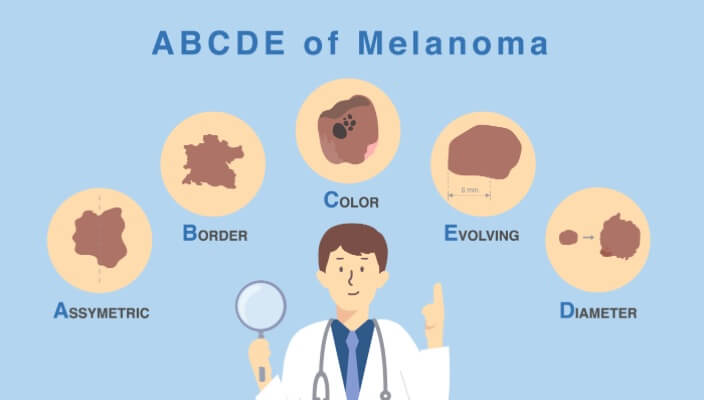
- Skin Cancer
- Skin Exams
Discover the ABCDEs of melanoma. Familiarize yourself with the five key indicators to aid in early detection and prompt medical attention for any suspicious moles or skin lesions.
Read MoreFeatured Products for Sun Protection

EltaMD UV Clear SPF 46 original
Oil-free EltaMD UV Clear helps calm and protect sensitive skin types prone to discoloration and breakouts associated to acne and rosacea. It contains niacinamide (vitamin B3), hyaluronic acid and lactic acid, ingredients that promote the appearance of healthy-looking skin. Very lightweight and silky, it may be worn with makeup or alone. Choose from tinted and untinted formulas for use every day. 1.7 oz / 48 g

EltaMD UV Clear SPF 46
Oil-free EltaMD UV Clear helps calm and protect sensitive skin types prone to discoloration and breakouts associated to acne and rosacea. It contains niacinamide (vitamin B3), hyaluronic acid and lactic acid, ingredients that promote the appearance of healthy-looking skin. Very lightweight and silky, it may be worn with makeup or alone. Choose from tinted and untinted formulas for use every day. 1.7 oz / 48 g


